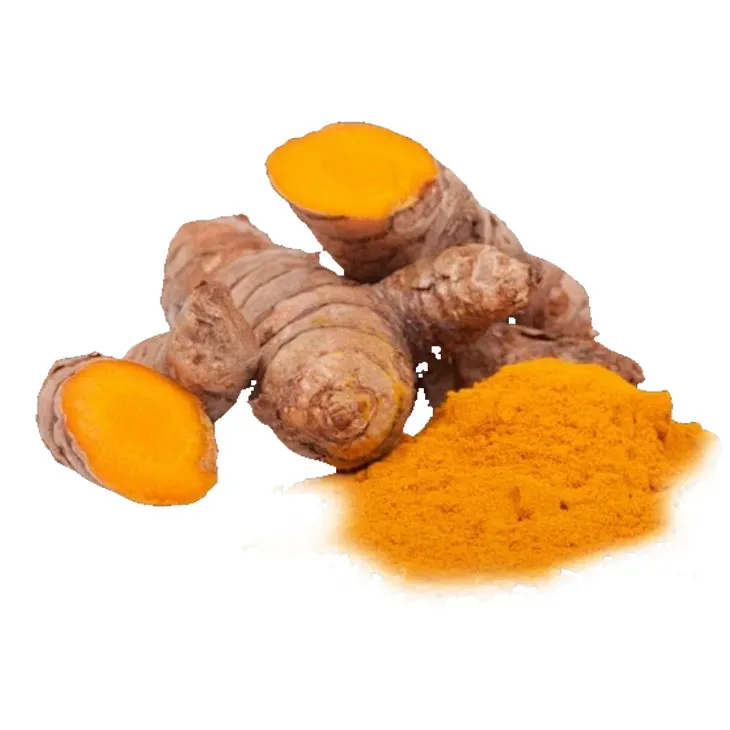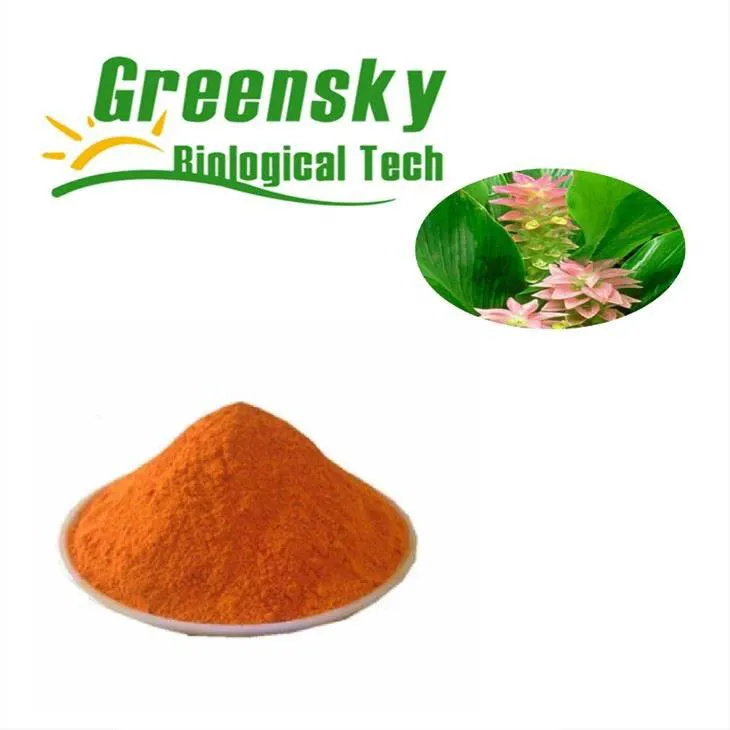- 0086-571-85302990
- sales@greenskybio.com
Is curcumin beneficial for diabetes? Are these all safe and applicable for diabetic patients?
2024-11-12

1. Introduction
Diabetes mellitus is a chronic metabolic disorder that has reached epidemic proportions globally. Management of diabetes involves a combination of lifestyle modifications, pharmacological interventions, and continuous monitoring. In recent years, there has been growing interest in the potential role of natural compounds in diabetes management. Curcumin, a polyphenol derived from the turmeric plant (Curcuma longa), has been studied extensively for its various health - promoting properties. This article aims to comprehensively analyze whether Curcumin is beneficial for diabetes and its safety and applicability in diabetic patients.

2. Understanding Diabetes
Diabetes is characterized by elevated blood glucose levels due to either insufficient insulin production (Type 1 diabetes) or insulin resistance combined with relative insulin deficiency (Type 2 diabetes). High blood glucose over time can lead to a plethora of complications, including cardiovascular diseases, kidney damage, nerve damage, and eye problems.
2.1 Type 1 Diabetes
Type 1 diabetes is an autoimmune disease in which the body's immune system attacks and destroys the insulin - producing beta cells in the pancreas. This results in a complete lack of insulin production, and patients with Type 1 diabetes require lifelong insulin replacement therapy.
2.2 Type 2 Diabetes
Type 2 diabetes is more common and is often associated with lifestyle factors such as obesity, physical inactivity, and an unhealthy diet. In this type, the body becomes resistant to the normal actions of insulin, and the pancreas may also gradually lose its ability to produce sufficient insulin over time.

3. Curcumin: Chemical Properties and Sources
Curcumin is the main bioactive component of turmeric. It has a bright yellow color and is responsible for the characteristic color of turmeric. Turmeric has been used for centuries in traditional medicine, particularly in Ayurvedic and Chinese medicine. Curcumin can be obtained from turmeric powder, which is a common spice used in cooking, especially in Asian and Middle - Eastern cuisines. However, for therapeutic purposes, curcumin is also available in supplement form, often in combination with other ingredients to enhance its absorption.

4. Potential Benefits of Curcumin in Diabetes
4.1 Anti - inflammatory Effects
Chronic inflammation is a key factor in the development and progression of diabetes. Curcumin has strong anti - inflammatory properties. It can inhibit the activation of various inflammatory pathways, such as the nuclear factor - kappa B (NF - κB) pathway. By reducing inflammation, curcumin may help improve insulin sensitivity and glucose metabolism. In animal studies, curcumin supplementation has been shown to decrease markers of inflammation in diabetic models, which could potentially translate to better glycemic control in humans.
4.2 Antioxidant Activity
Oxidative stress is also closely associated with diabetes. High blood glucose levels can lead to an increase in the production of reactive oxygen species (ROS), which can damage cells and tissues. Curcumin is a potent antioxidant that can scavenge ROS and protect cells from oxidative damage. This antioxidant activity may contribute to the prevention of diabetic complications, such as neuropathy and retinopathy, by maintaining the integrity of nerve and eye tissues.
4.3 Effects on Insulin Sensitivity
Several studies have suggested that curcumin can enhance insulin sensitivity. It may act on multiple targets within the body to improve the cells' response to insulin. For example, curcumin has been shown to regulate the expression of genes involved in glucose uptake and metabolism in adipose tissue and muscle cells. In clinical trials, some evidence has been found to support the improvement of insulin sensitivity in patients with type 2 diabetes after curcumin supplementation, although more research is needed to confirm these findings.
4.4 Blood Glucose Regulation
Curcumin may also directly affect blood glucose levels. It has been proposed that curcumin can inhibit certain enzymes involved in carbohydrate metabolism, such as alpha - glucosidase. By inhibiting these enzymes, curcumin can slow down the digestion and absorption of carbohydrates, leading to a more gradual increase in blood glucose levels after a meal. This can be beneficial for diabetic patients in controlling post - prandial hyperglycemia.

5. Scientific Evidence Supporting Curcumin's Role in Diabetes
Many pre - clinical studies in animal models of diabetes have demonstrated the potential benefits of curcumin. These studies have shown improvements in blood glucose control, insulin sensitivity, and reduction in diabetic complications. However, the translation of these findings to human studies has been somewhat inconsistent.
5.1 Animal Studies
In diabetic rats, for example, curcumin supplementation has been shown to significantly reduce fasting blood glucose levels, improve glucose tolerance, and decrease the levels of glycated hemoglobin (HbA1c), a marker of long - term blood glucose control. Additionally, in mice models of type 2 diabetes, curcumin has been associated with reduced inflammation in adipose tissue and improved insulin signaling.
5.2 Human Studies
Some small - scale human trials have provided promising results. In a study of patients with type 2 diabetes, curcumin supplementation for a certain period led to a slight but significant reduction in fasting blood glucose levels. Another study reported an improvement in insulin sensitivity index after curcumin treatment. However, larger and more long - term clinical trials are still required to establish a definitive role for curcumin in diabetes management. The variability in results may be due to differences in study design, dosage of curcumin used, and the characteristics of the patient populations studied.

6. Safety Considerations of Curcumin for Diabetic Patients
6.1 General Safety
Curcumin is generally considered safe when consumed in amounts typically found in food. However, when used as a supplement in high doses, it may cause some side effects. These can include gastrointestinal issues such as nausea, diarrhea, and abdominal pain. Diabetic patients, especially those with pre - existing gastrointestinal problems, should be cautious when considering high - dose curcumin supplementation.
6.2 Interaction with Medications
Another important safety consideration is the potential interaction of curcumin with diabetes medications. Curcumin may interact with drugs that are metabolized by the liver, such as some oral hypoglycemic agents. For example, it may affect the metabolism of metformin, potentially altering its effectiveness. Diabetic patients who are taking medications should consult their healthcare providers before starting curcumin supplementation to ensure there are no adverse interactions.
6.3 Absorption and Bioavailability
Curcumin has relatively low bioavailability, meaning that only a small amount of the ingested curcumin is actually absorbed and available to exert its effects in the body. This can be a limitation when considering its therapeutic use in diabetes. However, there are ways to improve curcumin's bioavailability, such as combining it with piperine (found in black pepper), which has been shown to enhance curcumin absorption.
7. Applicability of Curcumin in Diabetes Management
While curcumin shows potential in diabetes management, its applicability in real - world diabetes care needs to be carefully considered.
7.1 Dietary Incorporation
One way to potentially benefit from curcumin is through dietary intake. Adding turmeric, which contains curcumin, to the diet can be a simple and natural approach. This can be done by using turmeric in cooking, for example, in curries, soups, or smoothies. However, the amount of curcumin obtained from dietary sources alone may not be sufficient to achieve significant therapeutic effects in diabetes management.
7.2 Supplementation
For those who may want to use curcumin supplements, it is important to choose high - quality products. The dosage and duration of supplementation should be based on individual needs and under the guidance of a healthcare provider. As mentioned earlier, due to the potential for side effects and interactions, self - medication with curcumin supplements is not advisable for diabetic patients without proper medical advice.
8. Conclusion
Curcumin has shown several potential benefits in diabetes, including anti - inflammatory, antioxidant, and effects on insulin sensitivity and blood glucose regulation. However, the scientific evidence from human studies is still not conclusive. While curcumin is generally safe when consumed in normal amounts, there are safety concerns, especially when used as a supplement in high doses or in combination with diabetes medications. Diabetic patients who are interested in using curcumin for diabetes management should consult their healthcare providers to ensure its safety and effectiveness. Future research should focus on larger, well - designed clinical trials to further clarify the role of curcumin in diabetes and develop optimal strategies for its use in diabetic patients.
FAQ:
1. What is curcumin?
Curcumin is a natural compound. It is the main active ingredient in turmeric, a spice commonly used in cooking, especially in Asian cuisine. It has antioxidant, anti - inflammatory, and other biological properties.
2. How might curcumin be beneficial for diabetes?
Some research suggests that curcumin may help with diabetes in several ways. It may improve insulin sensitivity, which means the body can use insulin more effectively to regulate blood sugar levels. Also, its anti - inflammatory properties might reduce inflammation associated with diabetes, which can contribute to better overall health. Additionally, it could potentially play a role in preventing or delaying the development of diabetes - related complications.
3. Are there any scientific studies supporting curcumin's benefits for diabetes?
Yes, there are multiple scientific studies. For example, some in - vitro and in - vivo studies have shown that curcumin can affect various molecular pathways related to glucose metabolism and insulin action. However, more large - scale, long - term human clinical trials are still needed to firmly establish its efficacy.
4. Is curcumin safe for diabetic patients?
Generally, curcumin is considered safe for most people when taken in normal amounts. But diabetic patients should still be cautious. Some forms of curcumin supplements may interact with medications they are taking. Also, in very high doses, it may cause some side effects such as digestive problems. So, it is always advisable for diabetic patients to consult their doctor before starting to take curcumin.
5. How should diabetic patients take curcumin if they want to try it?
If diabetic patients want to try curcumin, they should first consult their healthcare provider. If approved, they should follow the recommended dosage on the product label. It is often better to choose a high - quality supplement from a reliable source. And they should closely monitor their blood sugar levels and any potential side effects while taking it.
Related literature
- The Role of Curcumin in Diabetes: A Review of the Evidence"
- "Curcumin and Diabetic Complications: Preclinical and Clinical Studies"
- "Beneficial Effects of Curcumin on Insulin Resistance in Diabetes"
- ▶ Hesperidin
- ▶ Citrus Bioflavonoids
- ▶ Plant Extract
- ▶ lycopene
- ▶ Diosmin
- ▶ Grape seed extract
- ▶ Sea buckthorn Juice Powder
- ▶ Fruit Juice Powder
- ▶ Hops Extract
- ▶ Artichoke Extract
- ▶ Mushroom extract
- ▶ Astaxanthin
- ▶ Green Tea Extract
- ▶ Curcumin
- ▶ Horse Chestnut Extract
- ▶ Other Product
- ▶ Boswellia Serrata Extract
- ▶ Resveratrol
- ▶ Marigold Extract
- ▶ Grape Leaf Extract
- ▶ New Product
- ▶ Aminolevulinic acid
- ▶ Cranberry Extract
- ▶ Red Yeast Rice
- ▶ Red Wine Extract
-
Artichoke Leaf Extract
2024-11-12
-
Almond Extract Powder
2024-11-12
-
Milk Thistle Extract
2024-11-12
-
Nutmeg Extract
2024-11-12
-
Grape Seed Extract
2024-11-12
-
Hawthorn Extract
2024-11-12
-
Ginger Extract
2024-11-12
-
Alfalfa Meal
2024-11-12
-
Angelica sinensis extract
2024-11-12
-
Jujube Extract
2024-11-12





















